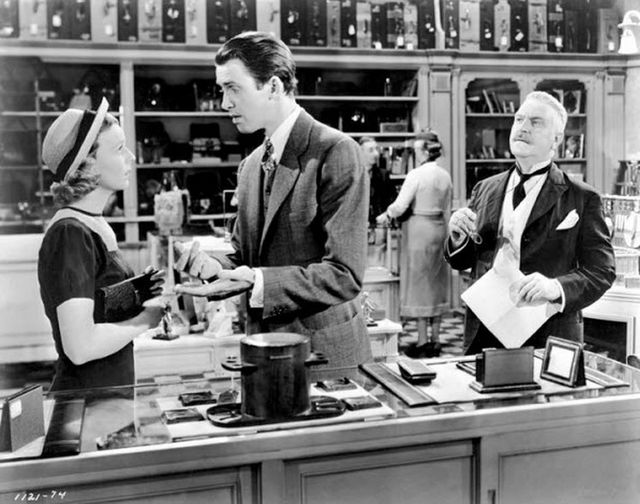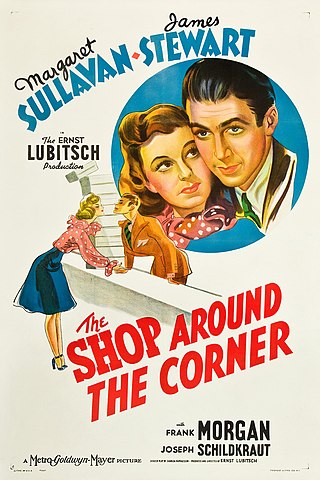The Shop Around the Corner
1940 film by Ernst Lubitsch From Wikipedia, the free encyclopedia
The Shop Around the Corner is a 1940 American romantic comedy-drama film produced and directed by Ernst Lubitsch and starring Margaret Sullavan, James Stewart, Frank Morgan, and Joseph Schildkraut. The screenplay by Samson Raphaelson is based on the 1937 Hungarian play Parfumerie by Miklós László.[2][3] Eschewing regional politics in the years leading up to World War II, the film is about two employees at a leather goods shop in Budapest who can barely stand each other, not realizing they are falling in love as anonymous correspondents through their letters.[2]
| The Shop Around the Corner | |
|---|---|
 Theatrical release poster | |
| Directed by | Ernst Lubitsch |
| Screenplay by |
|
| Based on | Parfumerie 1937 play by Miklós László |
| Produced by | Ernst Lubitsch |
| Starring | |
| Cinematography | William Daniels |
| Edited by | Gene Ruggiero |
| Music by | Werner R. Heymann |
Production company | |
| Distributed by | Loew's Inc. |
Release date |
|
Running time | 99 minutes |
| Country | United States |
| Language | English |
| Budget | $500,000[1] |
| Box office | $380,000 (EU) |
The Shop Around the Corner is ranked number 28 on AFI's 100 Years... 100 Passions, and is listed in Time's All-Time 100 Movies.[4] In 1999, the film was selected for preservation in the United States National Film Registry by the Library of Congress as being "culturally, historically, or aesthetically significant".[5][6][7]
Plot
Summarize
Perspective

During the Great Depression Alfred Kralik is the top salesman at Matuschek and Company, a leathergoods shop in Budapest owned by the high-strung Mr. Hugo Matuschek. Kralik's co-workers include his friend, Pirovitch, a kindly family man; Ferencz Vadas, a two-faced womanizer; saleswoman Ilona Novotny; clerk Flora Kaczek; and Pepi Katona, an ambitious, precocious delivery boy. One morning, Kralik reveals to Pirovitch that he has been corresponding anonymously with an intelligent and cultured woman whose ad he came across in the newspaper. Kralik responded to the ad, wanting to increase his knowledge about culture. As they correspond they agree to withhold details about their personal lives.
Kralik is Mr. Matuschek's oldest and most trusted employee, but tension starts arising between the two. They get into an argument over Mr. Matuschek's idea to sell a cigarette box that plays "Ochi Chërnye" when opened. After their exchange, Klara Novak enters the gift shop looking for a job. Kralik and Matuschek tell her there are no openings, but when she is able to sell one of the cigarette boxes as a candy box, Mr. Matuschek hires her. However, she and Kralik do not get along.
Six months later, as Christmas approaches, Kralik is preparing to meet his mystery correspondent for a dinner date. The meeting is stalled when Mr. Matuschek demands that everyone stay after work to decorate the shop. When Novak and Kralik request the night off, Mr. Matuschek becomes angry. Mr. Matuschek is irritable because he suspects his wife is having an affair, as she stays out late and requests money from him. Mr. Matuschek calls Kralik to his office and fires him. No one in the shop understands Mr. Matuschek's actions are related to his suspicions that Kralik is having an affair with his wife. Later, Mr. Matuschek meets with a private investigator who informs him that his wife is having an affair with Ferencz Vadas. Pepi returns to the shop just in time to prevent Mr. Matuschek from committing suicide.
Meanwhile, Kralik arrives at the Cafe Nizza, where he discovers that his mystery woman is Novak. Despite his disappointment, Kralik goes in and talks with her, pretending he is there to meet Pirovitch. In his mind, Kralik tries to reconcile the cultured woman of his letters with his annoying co-worker, secretly hoping that things might work out with her. Concerned that Kralik's presence will spoil her first meeting with her "far superior" mystery correspondent, she calls Kralik a "little insignificant clerk" and asks him to leave. Later that night, Kralik goes to the hospital to visit Mr. Matuschek, who apologizes for suspecting him of having an affair with his wife, before offering him a job as manager of Matuschek and Company. Grateful to Pepi for saving his life, Mr. Matuschek promotes him to clerk. The next day, Novak calls in sick after her mystery man failed to show, and at Mr. Matuschek's behest, Kralik fires Vadas. That night, when Kralik visits Novak at her apartment, she receives a letter from her correspondent and reads it in front of Kralik, who wrote the letter.
Two weeks later, on Christmas Eve, Matuschek and Company achieves record sales. Kralik and Novak, alone in the shop as they close up, discuss their planned dates for the evening and Novak reveals that she had a crush on Kralik when they first met. She explains that she was initially irritable with him in an effort to pique his interest in her. After pretending to have met Novak's mystery man, Kralik describes him in unflattering terms. When Novak expresses her disappointment, Kralik quotes one of her letters and places a red carnation in his lapel, revealing to her that he is her mystery correspondent. Both are happy and they kiss.
Cast

- Margaret Sullavan as Klara Novak
- James Stewart as Alfred Kralik
- Frank Morgan as Hugo Matuschek
- Joseph Schildkraut as Ferencz Vadas
- Sara Haden as Flora Kaczek
- Felix Bressart as Pirovitch
- William Tracy as Pepi Katona
- Inez Courtney as Ilona Novotny
- Sarah Edwards as woman customer
- Edwin Maxwell as doctor
- Charles Halton as detective
- Charles Smith as Rudy[N 1]
- Charles Arnt as Policeman (uncredited)
- Mabel Colcord as Anna, Klara's aunt (uncredited)
- Mary Carr as Klara's grandmother (uncredited)
- William Edmunds as waiter (uncredited)
- Grace Hayle as plump customer (uncredited)
Production
The rights to Miklós László's play was purchased by Ernst Lubitsch in 1938 for $7,500 (equivalent to $167,535 in 2024), and shopped around to different studios over the following year. Dolly Haas and Janet Gaynor were each at one point attached to the film before Margaret Sullavan was cast in the lead role alongside James Stewart; neither was available at the time that production was originally set to begin, so Lubitsch decided to postpone the start date. The film was shot in chronological order.[8]
Reception
Summarize
Perspective

On the review aggregator website Rotten Tomatoes, 99% of 96 critics' reviews are positive, with an average rating of 8.6/10. The website's consensus reads: "Deftly directed by Ernst Lubitsch from a smart, funny script by Samson Raphaelson, The Shop Around the Corner is a romantic comedy in the finest sense of the term."[9] Metacritic, which uses a weighted average, assigned the film a score of 96 out of 100, based on 15 critics, indicating "universal acclaim".[10]
Dave Kehr argued Lubitsch makes "brilliant deployment of point of view, allowing the audience to enter the perceptions of each character at exactly the right moment to develop maximum sympathy and suspense."[11] It ranked 202nd in the British Film Institute's 2012 Sight & Sound critics' poll of the greatest films ever made, having garnered eight critics' votes.[12] The work was also 58th in BBC's 2015 poll of the best American films.[13]
Film historian David Thomson wrote:
Among the greatest of all films. This is a love story about a couple too much in love with love to fall tidily into one another's arms. Though it all works out finally, a mystery is left, plus the fear of how easily good people can miss their chances. ...[The movie] is a treasury of hopes and anxieties based in the desperate faces of Stewart and Sullavan. It is a comedy so good it frightens us for them. The café conversation may be the best meeting in American film. The shot of Sullavan's gloved hand, and then her ruined face, searching an empty mail box for a letter is one of the most fragile moments in film. For an instant, the ravishing Sullavan looks old and ill, touched by loss.[14]
Adaptations
The Shop Around the Corner was dramatized in two half-hour broadcasts of The Screen Guild Theater, first on September 29, 1940, with Margaret Sullavan and James Stewart,[15] second on February 26, 1945, with Van Johnson and Phyllis Thaxter. It was also dramatized as a one-hour program on Lux Radio Theater's June 23, 1941 broadcast with Claudette Colbert and Don Ameche.
Remakes
The film has spawned numerous remakes, among which number:
- A musical, In the Good Old Summertime (1949), starring Judy Garland and Van Johnson.
- The 1963 Broadway musical She Loves Me.
- Nora Ephron's You've Got Mail (1998) revolves around two people (Tom Hanks and Meg Ryan) who cultivate an intense personal dislike for one another while carrying on an anonymous romance via email. The film lifts the original's premise as well as some scenes that share similar jokes and lines of dialogue. Meg Ryan's character owns a bookstore called "The Shop Around the Corner". Story credit was given to Miklós László for Parfumerie, the Hungarian play from which the 1940 film was adapted.
- The 1996 Indian Tamil-language romance film Kadhal Kottai directed by Agathiyan.[citation needed]
- Hallmark's Hanukkah on Rye (2022), starring Yael Grobglas and Jeremy Jordan.[16]
See also
Notes
- In the musical remake In the Good Old Summertime, an uncredited Charles Smith is one of the quartet singing with Judy Garland at the engagement party.
References
External links
Wikiwand - on
Seamless Wikipedia browsing. On steroids.
